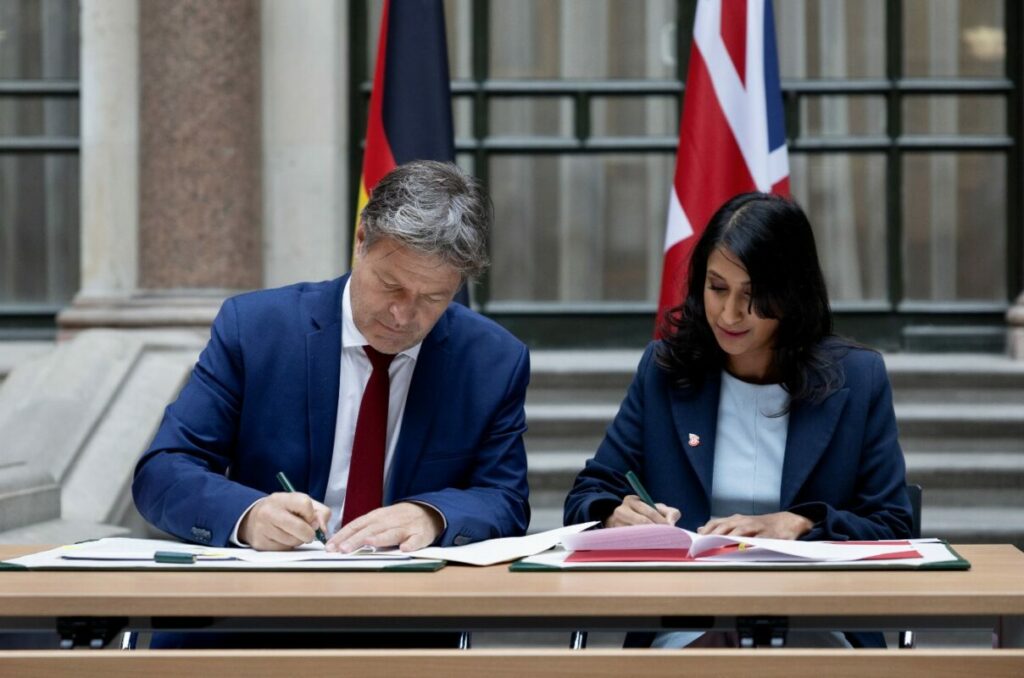The UK and Germany signed a new clean energy agreement on Friday (3 November) aiming to remove regulatory barriers on renewables.
The partnership, which builds upon a previous hydrogen-based agreement signed earlier this year, is part of growing relations between the two European nations as they attempt to cement themselves at the forefront of the energy transition.
As part of the agreement, the two countries have made several commitments. Perhaps the most noteworthy of these are plans to enhance cooperation on renewables with a focus on offshore wind and electricity interconnection in addition to accelerating the deployment of offshore hybrid projects.
This is of particular importance namely due to the presence of both nations in the North Sea, a region with huge potential for offshore wind deployment. In the field of offshore wind, around 75% of installed offshore wind capacity in the North Sea is in German and British waters.
This is set to be bolstered in the near future as well with the UK targeting up to 50GW of offshore wind deployment by 2030 and Germany aiming for 30GW by the end of the decade.
Other commitments include sharing knowledge and expertise to improve the exploration of carbon capture, utilisation and storage, strengthening and promoting regional and global energy security and sharing best practices and lessons learned on industrial, buildings and heat decarbonisation, energy efficiency and net zero policies and strategies.
The agreement was signed in London by the UK’s energy security secretary Claire Coutinho and Germany’s vice-chancellor, Robert Habeck.
When it comes to energy, the UK & Germany have much in common.
— Claire Coutinho MP (@ClaireCoutinho) November 3, 2023
The partnership I signed with @BMWK today will deepen our collaboration on new technologies like hydrogen, offshore wind and carbon capture. Good news for cheaper, cleaner energy and shoring up our energy security. pic.twitter.com/E8iqhAtZ8j
“The UK and Germany agree on the importance of clean, affordable energy and we both recognise its crucial role in growing our economies and guaranteeing national and global energy security,” said Coutinho.
“We are already working together in the North Sea to deliver our world-leading offshore wind ambitions, as well as linking our countries with subsea electricity cables. “Today’s agreement will see us extend and deepen our partnership to ensure we continue to lead Europe and the world in making the green transition.”
Habeck added: “Germany and the UK face similar challenges. We have made good progress regarding the transition towards climate neutrality, but there is still a long path ahead of us. Cooperation with reliable partners can help all partners to advance not only faster, but better.
“We can learn from each other’s experiences, share knowledge and work together to reach our common goals. The joint declaration signed today builds upon a long history of cooperation and provides a sound framework for successfully working together in future.”
UK-Germany interconnection makes progress
Another key milestone was achieved last week with confirmation that the first phase of major construction of the £2.4 billion NeuConnect project, the first subsea electricity cable between the two countries, was completed.
Anticipated to be completed in 2028, the cable will be the second longest UK electricity power line with approximately 725km of land and subsea cables, connecting Kent and Wilhelmshaven.
It is important to note that another interconnector project connecting the UK to Germany is currently in development and awaiting regulatory approval from Ofgem.






